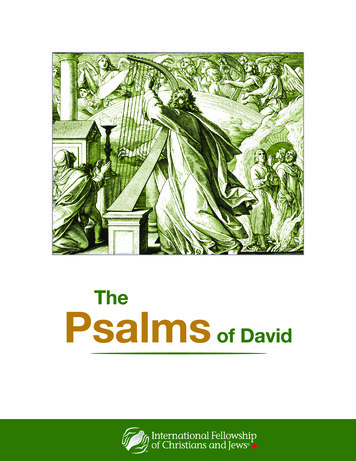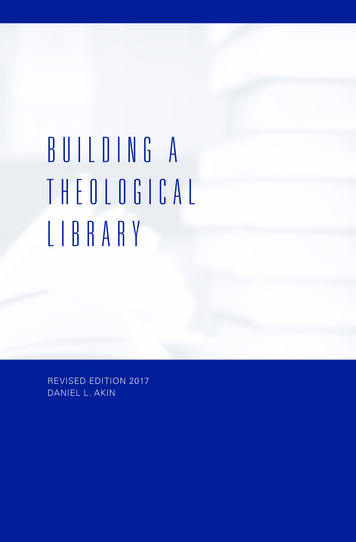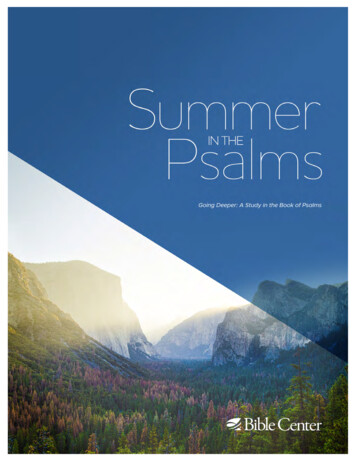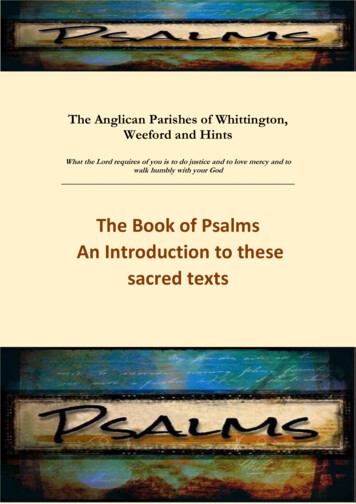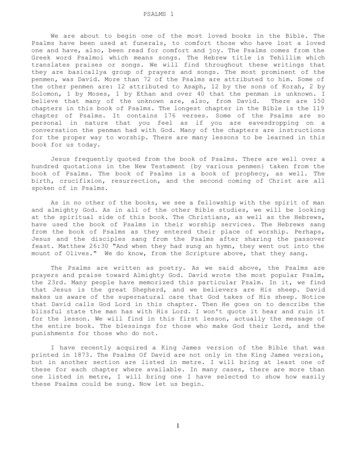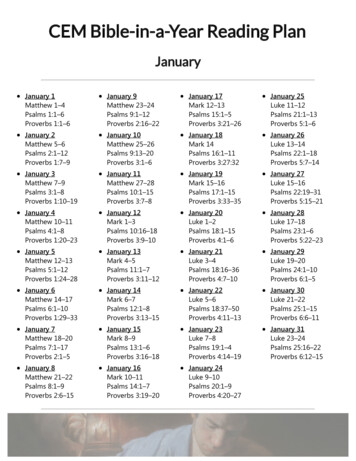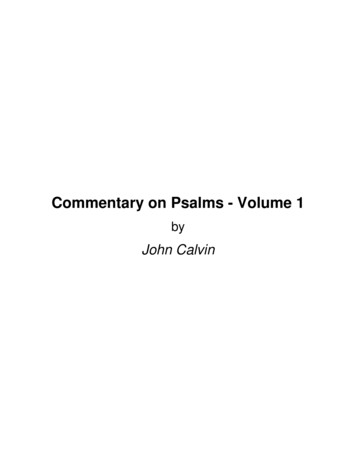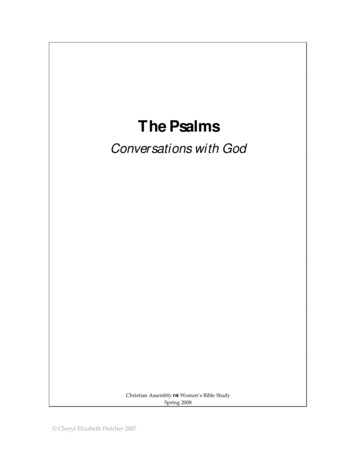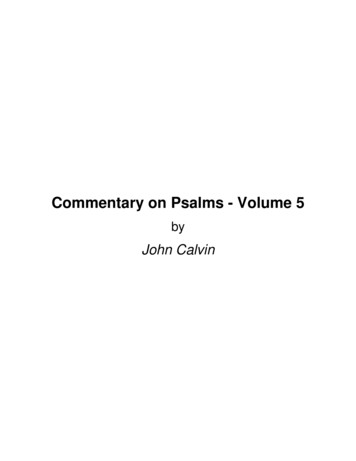
Transcription
Commentary on Psalms - Volume 5byJohn Calvin
THE WRITINGS IN THIS E-BOOK ARE IN THE PUBLIC DOMAINTHEY ARE BEING PRESENTED HERE BYTHE BIBLE TRUTH FORUMhttp://www.bibletruthforum.comAS PART OF OUR BIBLE TRUTH LIBRARY CD
Commentary on Psalms - Volume 5John CalvinTable of ContentsAbout This Book. . . . . . . . . . . . . . .Commentary on Psalms 119:121-150.Translator's Preface. . . . . . . . . . . . .Psalm 119 (cont.). . . . . . . . . . . . . .Psalm 119:121-128. . . . . . . . . . . .Psalm 119:129-136. . . . . . . . . . . .Psalm 119:137-144. . . . . . . . . . . .Psalm 119:145-152. . . . . . . . . . . .Psalm 119:153-160. . . . . . . . . . . .Psalm 119:161-168. . . . . . . . . . . .Psalm 119:169-174. . . . . . . . . . . .Psalm 120. . . . . . . . . . . . . . . . . . .Psalm 120:1-4. . . . . . . . . . . . . . .Psalm 120:5-7. . . . . . . . . . . . . . .Psalm 121. . . . . . . . . . . . . . . . . . .Psalm 121:1-2. . . . . . . . . . . . . . .Psalm 121:3-5. . . . . . . . . . . . . . .Psalm 121:6-8. . . . . . . . . . . . . . .Psalm 122. . . . . . . . . . . . . . . . . . .Psalm 122:1-3. . . . . . . . . . . . . . .Psalm 122:4-5. . . . . . . . . . . . . . .Psalm 122:6-9. . . . . . . . . . . . . . .Psalm 123. . . . . . . . . . . . . . . . . . .Psalm 123:1-4. . . . . . . . . . . . . . .Psalm 124. . . . . . . . . . . . . . . . . . .Psalm 124:1-5. . . . . . . . . . . . . . .Psalm 124:6-8. . . . . . . . . . . . . . .Psalm 125. . . . . . . . . . . . . . . . . . .Psalm 125:1-2. . . . . . . . . . . . . . .Psalm 125:3-5. . . . . . . . . . . . . . .Psalm 126. . . . . . . . . . . . . . . . . . .Psalm 126:1-3. . . . . . . . . . . . . . .Psalm 126:4-6. . . . . . . . . . . . . . .Psalm 127. . . . . . . . . . . . . . . . . . .Psalm 127:1-2. . . . . . . . . . . . . . .iii.p. iip. 1p. 2p. 4p. 4p. 8p. 13p. 16p. 19p. 23p. 28p. 32p. 33p. 35p. 38p. 38p. 39p. 40p. 42p. 42p. 44p. 46p. 49p. 49p. 52p. 52p. 53p. 55p. 55p. 56p. 59p. 59p. 61p. 64p. 64
Commentary on Psalms - Volume 5Psalm 127:3-5. .Psalm 128. . . . . .Psalm 128:1-3. .Psalm 128:4-6. .Psalm 129. . . . . .Psalm 129:1-4. .Psalm 129:5-8. .Psalm 130. . . . . .Psalm 130:1-4. .Psalm 130:5-6. .Psalm 130:7-8. .Psalm 131. . . . . .Psalm 131:1. . . .Psalm 131:2-3. .Psalm 132. . . . . .Psalm 132:1-5. .Psalm 132:6-9. .Psalm 132:10-12.Psalm 132:13-16.Psalm 132:17-18.Psalm 133. . . . . .Psalm 133:1-3. .Psalm 134. . . . . .Psalm 134:1-3. .Psalm 135. . . . . .Psalm 135:1-4. .Psalm 135:5-7. .Psalm 135:8-12.Psalm 135:13-14.Psalm 135:15-21.Psalm 136. . . . . .Psalm 136:1-9. .Psalm 136:10-16.Psalm 136:17-26.Psalm 137. . . . . .Psalm 137:1-4. .Psalm 137:5-9. .Psalm 138. . . . . .Psalm 138:1-5. .Psalm 138:6-8. .John Calvin.iv.p. 67p. 70p. 70p. 72p. 74p. 74p. 77p. 79p. 79p. 82p. 83p. 86p. 86p. 87p. 89p. 89p. 91p. 94p. 97p. 98p. 101p. 101p. 104p. 104p. 106p. 106p. 107p. 110p. 111p. 112p. 113p. 113p. 115p. 116p. 118p. 118p. 121p. 124p. 124p. 126
Commentary on Psalms - Volume 5Psalm 139. . . . . .Psalm 139:1-6. .Psalm 139:7-12.Psalm 139:13-16.Psalm 139:17-18.Psalm 139:19-24.Psalm 140. . . . . .Psalm 140:1-5. .Psalm 140:6-10.Psalm 140:11-13.Psalm 141. . . . . .Psalm 141:1-4. .Psalm 141:5-7. .Psalm 141:8-10.Psalm 142. . . . . .Psalm 142:1-4. .Psalm 142:5-7. .Psalm 143. . . . . .Psalm 143:1-3. .Psalm 143:4-7. .Psalm 143:8-12.Psalm 144. . . . . .Psalm 144:1-4. .Psalm 144:5-8. .Psalm 144:9-11.Psalm 144:12-15.Psalm 145. . . . . .Psalm 145:1-6. .Psalm 145:7-13.Psalm 145:14-16.Psalm 145:17-21.Psalm 146. . . . . .Psalm 146:1-5. .Psalm 146:6-10.Psalm 147. . . . . .Psalm 147:1-6. .Psalm 147:7-11.Psalm 147:12-14.Psalm 147:15-20.Psalm 148. . . . . .John Calvin.v.p. 129p. 129p. 131p. 133p. 135p. 136p. 140p. 140p. 142p. 143p. 145p. 145p. 147p. 150p. 152p. 152p. 153p. 155p. 155p. 157p. 158p. 162p. 162p. 164p. 165p. 166p. 169p. 169p. 170p. 172p. 174p. 177p. 177p. 179p. 181p. 181p. 183p. 185p. 185p. 188
Commentary on Psalms - Volume 5Psalm 148:1-6. . . . . . .Psalm 148:7-10. . . . . .Psalm 148:11-14. . . . . .Psalm 149. . . . . . . . . . .Psalm 149:1-4. . . . . . .Psalm 149:5-9. . . . . . .Psalm 150. . . . . . . . . . .Psalm 150:1-6. . . . . . .Translation of the Psalms.Psalms 1-35. . . . . . . . .Psalm 1. . . . . . . . . .Psalm 2. . . . . . . . . .Psalm 3. . . . . . . . . .Psalm 4. . . . . . . . . .Psalm 5. . . . . . . . . .Psalm 6. . . . . . . . . .Psalm 7. . . . . . . . . .Psalm 8. . . . . . . . . .Psalm 9. . . . . . . . . .Psalm 10. . . . . . . . . .Psalm 11. . . . . . . . . .Psalm 12. . . . . . . . . .Psalm 13. . . . . . . . . .Psalm 14. . . . . . . . . .Psalm 15. . . . . . . . . .Psalm 16. . . . . . . . . .Psalm 17. . . . . . . . . .Psalm 18. . . . . . . . . .Psalm 19. . . . . . . . . .Psalm 20. . . . . . . . . .Psalm 21. . . . . . . . . .Psalm 22. . . . . . . . . .Psalm 23. . . . . . . . . .Psalm 24. . . . . . . . . .Psalm 25. . . . . . . . . .Psalm 26. . . . . . . . . .Psalm 27. . . . . . . . . .Psalm 28. . . . . . . . . .Psalm 29. . . . . . . . . .Psalm 30. . . . . . . . . .John Calvin.vi.p. 188p. 190p. 190p. 193p. 193p. 195p. 198p. 198p. 201p. 201p. 201p. 201p. 202p. 202p. 202p. 203p. 203p. 204p. 205p. 205p. 206p. 207p. 207p. 207p. 208p. 208p. 208p. 209p. 211p. 212p. 212p. 213p. 214p. 214p. 215p. 215p. 216p. 216p. 217p. 217
Commentary on Psalms - Volume 5Psalm 31. . .Psalm 32. . .Psalm 33. . .Psalm 34. . .Psalm 35. . .Psalms 36-66.Psalm 36. . .Psalm 37. . .Psalm 38. . .Psalm 39. . .Psalm 40. . .Psalm 41. . .Psalm 42. . .Psalm 43. . .Psalm 44. . .Psalm 45. . .Psalm 46. . .Psalm 47. . .Psalm 48. . .Psalm 49. . .Psalm 50. . .Psalm 51. . .Psalm 52. . .Psalm 53. . .Psalm 54. . .Psalm 55. . .Psalm 56. . .Psalm 57. . .Psalm 58. . .Psalm 59. . .Psalm 60. . .Psalm 61. . .Psalm 62. . .Psalm 63. . .Psalm 64. . .Psalm 65. . .Psalm 66. . .Psalms 67-92.Psalm 67. . .Psalm 68. . .John Calvin.vii.p. 218p. 219p. 220p. 220p. 221p. 222p. 222p. 223p. 224p. 225p. 226p. 227p. 227p. 228p. 228p. 229p. 230p. 231p. 231p. 231p. 232p. 233p. 234p. 234p. 235p. 235p. 236p. 237p. 237p. 238p. 239p. 239p. 239p. 240p. 241p. 241p. 242p. 242p. 242p. 243
Commentary on Psalms - Volume lm69. . . .70. . . .71. . . .72. . . .73. . . .74. . . .75. . . .76. . . .77. . . .78. . . .79. . . .80. . . .81. . . .82. . . .83. . . .84. . . .85. . . .86. . . .87. . . .88. . . .89. . . .90. . . .91. . . .92. . . .93-118.93. . . .94. . . .95. . . .96. . . .97. . . .98. . . .99. . . .100. . .101. . .102. . .103. . .104. . .105. . .106. . .107. . .John Calvin.viii.p. 244p. 245p. 246p. 247p. 248p. 249p. 250p. 250p. 251p. 251p. 254p. 254p. 255p. 256p. 256p. 257p. 257p. 258p. 258p. 259p. 260p. 261p. 262p. 263p. 263p. 263p. 264p. 264p. 265p. 265p. 266p. 266p. 267p. 267p. 267p. 268p. 269p. 270p. 272p. 273
Commentary on Psalms - Volume lm108. . . .109. . . .110. . . .111. . . .112. . . .113. . . .114. . . .115. . . .116. . . .117. . . .118. . . .119-150.119. . . .120. . . .121. . . .122. . . .123. . . .124. . . .125. . . .126. . . .127. . . .128. . . .129. . . .130. . . .131. . . .132. . . .133. . . .134. . . .135. . . .136. . . .137. . . .138. . . .139. . . .140. . . .141. . . .142. . . .143. . . .144. . . .145. . . .146. . . .John Calvin.ix.p. 275p. 275p. 277p. 277p. 277p. 278p. 278p. 279p. 279p. 280p. 280p. 281p. 281p. 286p. 286p. 287p. 287p. 287p. 288p. 288p. 288p. 289p. 289p. 289p. 290p. 290p. 291p. 291p. 291p. 292p. 293p. 293p. 294p. 294p. 295p. 296p. 296p. 296p. 297p. 298
Commentary on Psalms - Volume 5John CalvinPsalm 147. . . . . . . . . . . . . . . . . . . .Psalm 148. . . . . . . . . . . . . . . . . . . .Psalm 149. . . . . . . . . . . . . . . . . . . .Psalm 150. . . . . . . . . . . . . . . . . . . .Tables and Indices. . . . . . . . . . . . . . . .Psalms quoted in the New Testament. . .Major subjects addressed in each Psalm.Indexes. . . . . . . . . . . . . . . . . . . . . . . .Index of Scripture References. . . . . . . .Index of Scripture Commentary. . . . . . .Greek Words and Phrases. . . . . . . . . .Hebrew Words and Phrases. . . . . . . . .Latin Words and Phrases. . . . . . . . . . .French Words and Phrases. . . . . . . . . .x.p. 298p. 299p. 300p. 300p. 301p. 301p. 303p. 306p. 306p. 309p. 309p. 310p. 316p. 317
Comm on Psalms (V5)John CalvinCOMMENTARYONTHE BOOK OF PSALMSBY JOHN CALVINTRANSLATED FROM THE ORIGINAL LATIN, AND COLLATEDWITH THE AUTHOR'S FRENCH VERSION,BY THE REV. JAMES ANDERSONVOLUME FIFTHCHRISTIAN CLASSICS ETHEREAL LIBRARYGRAND RAPIDS, MIhttp://www.ccel.org
Comm on Psalms (V5)John CalvinVOLUME FIFTHTRANSLATOR’S PREFACE.In bringing to a close his labors on Calvin’s Commentary On The Psalms, the Editor begs leaveto state, that in addition to the General Index, and the Indices Of Texts Of Scripture, and of HebrewWords, originally contemplated, it has been deemed highly desirable to give at the end of theCommentary a Translation; or Calvin’s Version Of The, Psalms arranged in parallelisms, togetherwith a Table Of Those Passages In The Psalms Which Are Quoted In The New Testament, and aTable Of The Particular Subjects Of Each Psalm, according to Calvin’s interpretation. Theseadditions, it is hoped, will be considered as improvements. From the extent to which they haveincreased the size of this Volume, it has been found necessary to omit the Appendix of AdditionalCriticisms to which reference is made in some of the footnotes throughout the work.To exhibit the Psalms arranged in the metrical order, was an idea which appears never to havesuggested itself to the mind of Calvin. In his time, indeed, and long after it, the peculiar characterof Hebrew Poetry was not understood. It was not till a recent period that any steady light was;thrown on the laws of its composition. A vast amount of learning had indeed been expended on thesubject, and a variety of hypotheses had been suggested by successive writers to unravel a questionso intricate and mysterious; but no satisfactory result was attained until it was investigated by thelearned Bishop Lowth, to whose genius and erudition we are indebted for the discovery of this longlost secret. He has proved, with a clearness and force of evidence which has now commandeduniversal assent, that Hebrew Poetry bears no resemblance in its structure to the Poetry of Greeceand Rome, that it has no rhyming termination of lines as in the Poetry of our own language, andthat its peculiar, and perhaps its sole characteristic, lies in a felicitous arrangement of words intowhat he denominates Parallelism. In other words, its leading peculiarity is that. each sentenceconsists generally of two parts, closely corresponding to each other, not indeed in the number ofsyllables, but in the ideas which they express, or in their grammatical constructive form, the secondbeing synonymous (or, as Bishop Jebb would denominate it, cognate) with the first, — or antipatheticto it in its terms and sentiments, — or similar to it in the form of grammatical construction, suchas noun answering to noun, verb to verb, member to member, negative to negative, interrogativeto interrogative. 1 The division of these sacred poems into hemistichs or lines is, therefore, the formin which they ought naturally to be arranged; and such an arrangement is attended with greatadvantages. It exhibits to the eve the peculiar structure of Hebrew poetical composition, and is,besides, an important aid in Scriptural Interpretation, as it often contributes to the elucidation ofobscure and difficult passages, and enables even the mere English reader to discover a thousandbeauties, which, without such a help, would escape his notice.In translating this parallel version, two of Calvin’s translations of the Hebrew text were at theservice of the Editor, — the Latin and the French. The former is strictly literal, rarely changing theHebrew idiom, or even inserting a supplementary term, and uniformly giving the arrangement of1This sentence expresses the three specific heads into which Lowth discovered Hebrew parallelism, — which involves in itmuch variety and many gradations, — may be generally And more loosely distributed, Parallels Synonymous, (or, according toJEBB, Parallels Cognate,) Parallels Autithetic, and Parallels Synthetic or Constructive. For an example of the first, see Psalm1:1-5; of the second, see Psalm 20:7, 8; and of the third, see Psalm 148:7-13.2
Comm on Psalms (V5)John Calvinthe words as they stand in the inspired original. The latter is also upon the whole literal, though insome instances it changes the Hebrew idiom into the French, as well as frequently inserts suchsupplementary terms as the sense seems to require; and disregarding the arrangement of the wordsin the original, it gives them in the order most suitable to the genius of the French tongue. TheEditor has followed Calvin’s Latin; Version, and has rendered it literally, retaining the Hebrewmodes of expression, and the arrangement of the words in the sequence of the Hebrew text, exceptin a very few instances where a deviation seemed necessary to render the reading intelligible.Occasionally he has found it necessary to insert some supplementary words. These, when takenfrom Calvin’s French Version, as is generally the case, are printed simply in italics, and whensupplied by the Editor are printed in italics and enclosed within brackets. By adhering to the Hebreworder of the words, the arrangements may sometimes appear harsh and uncouth; but very often theygive much beauty and force to the expression. And in retaining the Hebrew idioms, the Editor hasfelt little scruple, considering that as our English Bible is a literal verbal translation of the OriginalHebrew, many of these are quite familiar to us, and from their peculiar grace have even becomenaturalized in our language.“The Hebrew idioms,” says Addison, “run into the English with a peculiar grace and beauty.Our language has received innumerable elegance’s and improvements from that infusion ofHebraisms which are derived to it out of the poetical passages in Holy Writ. They give a force andenergy to our expressions, warm and animate our language, and convey our thoughts in more ardentand intense phrases than any that are to be met with in our own tongue. There is something sopathetic in this kind of diction, that it often sets the mind in a flame, and makes our heart burnwithin Us.”The utility of the two Tables adverted to is too obvious to require to be dwelt upon. From theformer the reader will perceive how completely the inspiration of the Psalms is established by NewTestament authority, and how highly they were appreciated by Christ And His Apostles, there beingno portion of Old Testament Scripture from which they so frequently quoted. The other Table willreadily serve as a guide to the selection of such Psalms as may be adapted to the doctrines of theChristian system, the duties of the Christian life, or the varied circumstances, whether prosperousor adverse, in which the Christian or the Church of God may be placed.J.A.EDINBURGH, April 1849.3
Comm on Psalms (V5)John CalvinPsalm 119:121-128121. I have done judgment and righteousness: give me not up to my oppressors. 122. Becomesurety for thy servant for good, that the proud may not oppress me. 123. My eyes have failed forthy salvation, and for thy righteous word. 2 124. Deal with thy servant according to thy goodness,and teach me thy statutes. 125. I am thy servant, give me understanding, that I may learn thytestimonies. 126. It is time for thee, O Jehovah! to be doing for they have destroyed thy law. 127.And therefore I have loved thy statutes above gold, 3 yea even above the most fine gold 4 128.Therefore I have esteemed all thy commandments to be altogether right, and have hated every wayof lying.121. I have done judgment and righteousness. The Prophet implores the help of God againstthe wicked who troubled him, and he does so in such a manner as at the same time to testify thatthe harassing treatment he received from them was on his part altogether undeserved. If we wouldhave God to come down to succor us, it becomes us to see to it that we meet him with the testimonyof a good conscience. As He everywhere promises his aid to the afflicted who are unrighteouslyoppressed, it is no superfluous protestation which the Prophet makes, that he had not provoked hisenemies, but had restrained himself from all injury and wrong-doing, and had not even attemptedto requite evil for evil. In asserting that he had at all times done judgment, he means that whateverrite wicked practiced, he steadfastly persevered in following after integrity, and never turned asidefrom what was just and right in any of his public or private transactions.122. Become surety for thy servant for good. This prayer is almost similar to that of the precedingverse; for I prefer translating the Hebrew verb , arob, by Become surety for, to rendering, asothers do, Delight thy servant in good, or Make thy servant to delight in good According to thissecond version, the words are a prayer that God would rejoice his servant with his benefits. Thereis a third translation, by which they become a prayer that God would inspire his heart with the loveand desire of rectitude; for true perfection consists in our taking pleasure in justice and uprightness.But as from the last clause of the verse it is obvious that David here desires succor against hisenemies, the verb Become surety is the more appropriate rendering 5 Lord, as if he had said, sincethe proud cruelly rush upon me to destroy me, interpose. thyself between us, as if thou weft mysurety. The letter , lamed, which signifies for, is not indeed prefixed to the noun, but this is novalid objection to our translation, as that letter is often understood. It is a form of expression fullof comfort, to represent God as performing the office of a surety in order to effect our deliverance.He is said metaphorically to become surety for us, just as if, on finding us indebted in a large sumof money, he discharged us of the obligation, by paying down the money to our creditor. The prayer2345Literally, “for the word of thy righteousness.” Calvin understands it of the divine promises. Phillips translates “for the wordof thy justice,” “that is,” says he, “for the sentence of justice. on my oppressors, as the first part of the verse teaches; for thepassing this sentence will be equivalent to the granting the salvation which the Psalmist so ardently desired.”“Above gold. , mizahab, more than resplendent gold; gold without any stain or rust.” — Dr. Adam Clarke“Ou, marguerites.” — Fr. marg. “Or, pearls.” “ , umipaz, above solid gold; gold separated from the dross, perfectlyrefined.” — Dr. Adam Clarke.This verb signifies to be pleasant, acceptable. So Bucer has translated the first part of the verse, oblecta servum tuumbono; and indeed the Chaldee has given the same sense to the verb, for it is rendered by , make merry. But the other meaningwhich it has, viz. to become surety, is evidently more suitable; for the expression Be surety for thy servant for good, correspondsvery well with the previous and subsequent petitions, which are for deliverance from the hands of the enemy.” — Phillips.4
Comm on Psalms (V5)John Calvinis to this effect, That God would not suffer the wicked to exercise, their cruelty against us at theirpleasure, but that he would interpose as a defender to save us. By these words the Prophet intimates,that he was in extreme danger, and that he had nothing else left him in which to hope but the helpof God.123. My eyes have failed for thy salvation. 6 In the first; place he testifies, that he had beenafflicted with severe troubles, and that not for a short time only, but for a period so protracted asmight have exhausted his patience and occasioned despondency. But so far was this from beingthe effect they produced, that he declares that in all these long and wearisome conflicts his hearthad never sunk into despair. We have before explained failing for salvation as denoting that althoughthere was no prospect of an end to his
Commentary a Translation; or Calvin’s Version Of The, Psalms arranged in parallelisms, together with a Table Of Those Passages In The Psalms Which Are Quoted In The New Testament, and a Table Of The Particular Subjects Of Each Psalm, according to Calvin’s interpretation. These ad
